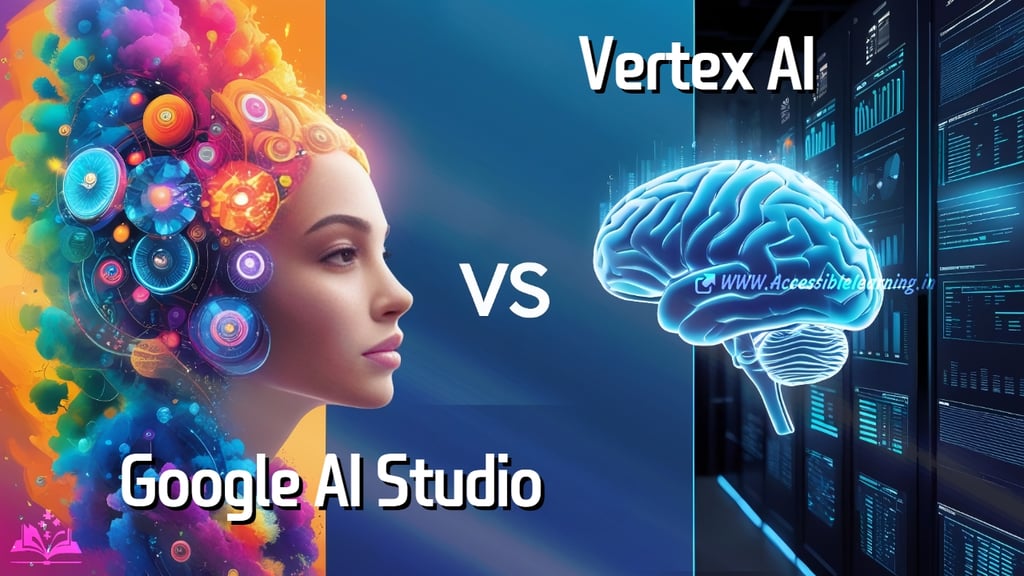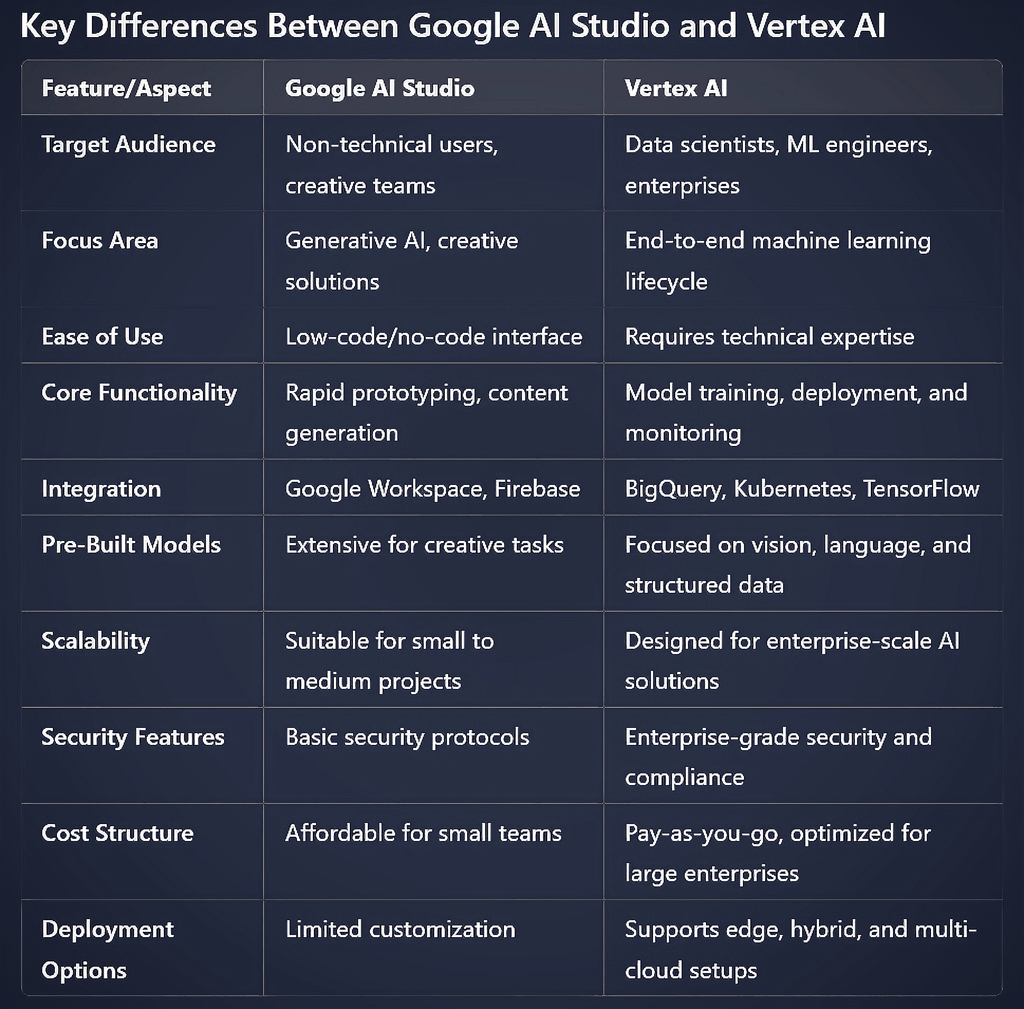
Google’s AI Tools Compared: AI Studio and Vertex AI Explained
Discover the key differences between Google AI Studio and Vertex AI in this in-depth comparison. Learn about their features, use cases, and how to choose the right AI platform for your business or creative projects.
AI ASSISTANTAI/FUTUREEDITOR/TOOLSEDUCATION/KNOWLEDGE
Sachin K Chaurasiya
2/7/20254 min read


The world of artificial intelligence (AI) is evolving rapidly, and Google has established itself as a major player in this domain. Among its many offerings, Google AI Studio and Vertex AI are prominent platforms that cater to different aspects of AI development and deployment. While both tools are under the Google umbrella, they serve distinct purposes, making them essential for developers, businesses, and researchers alike. This article delves into a detailed comparison of Google AI Studio and Vertex AI, exploring their features, use cases, and how they fit into the broader AI ecosystem.
Google AI Studio
Google AI Studio is a newly introduced platform designed to make AI development more accessible and intuitive, particularly for creative tasks and generative AI models. It focuses on empowering users with tools to build and customize AI models without requiring deep technical expertise. This platform integrates seamlessly with Google’s ecosystem and prioritizes user-friendly workflows.
Key Features
Generative AI Capabilities: Google AI Studio emphasizes generative AI, enabling users to create art, text, or multimedia content using advanced models.
Low-Code/No-Code Interface: Aimed at democratizing AI, it provides drag-and-drop interfaces for building AI solutions, making it accessible to non-technical users.
Pre-Built Templates: Offers ready-to-use models and templates for common AI tasks, reducing the time to value.
Collaboration Tools: Built-in features for team collaboration, enabling developers, designers, and stakeholders to work together on AI projects.
Google Ecosystem Integration: Seamless integration with tools like Google Workspace, Firebase, and Google Cloud services.
Customizable AI Models: Users can fine-tune pre-trained models or create custom models with minimal effort.
Cost-Effective Prototyping: Designed to make experimentation with AI affordable and scalable for small teams and startups.
Built-in Ethical AI Guidelines: Offers features to ensure responsible AI use, including bias detection and mitigation tools.
Use Cases
Content creation with generative AI.
Rapid prototyping for AI applications.
AI-driven personalization in marketing and customer engagement.
Educational tools for learning AI without coding expertise.
Creating interactive virtual assistants or chatbots for businesses.
Google AI Studio is particularly suitable for businesses looking to leverage AI creatively without investing heavily in technical resources.


Vertex AI
Vertex AI, on the other hand, is Google Cloud’s flagship platform for building, training, and deploying machine learning (ML) models. It is tailored for data scientists, machine learning engineers, and enterprises with advanced AI needs. Vertex AI combines Google’s powerful ML infrastructure with a robust suite of tools for end-to-end ML lifecycle management.
Key Features
Model Training and Deployment: Supports custom model training, hyperparameter tuning, and deploying models at scale.
AutoML Capabilities: Provides AutoML for users who want to train models without diving deep into coding.
MLOps Tools: Includes tools for version control, pipeline automation, monitoring, and retraining, enabling efficient operations.
Integration with BigQuery: Directly connects to Google BigQuery for seamless data handling and analysis.
Pre-Trained APIs: Offers pre-trained APIs for vision, language, and speech tasks, helping developers integrate AI without starting from scratch.
Vertex AI Workbench: A fully integrated Jupyter notebook environment for developing, analyzing, and experimenting with ML models.
Advanced Security and Compliance: Designed with enterprise-grade security, ensuring compliance with industry standards and regulations.
Edge AI Support: Enables deploying AI models to edge devices, optimizing for low latency and on-device processing.
Multi-Cloud and Hybrid Support: Allows seamless integration and operation across different cloud providers and on-premises environments.
Use Cases
Advanced predictive analytics for business intelligence.
Large-scale AI solutions in industries like healthcare, finance, and retail.
Custom ML model development for unique business requirements.
Real-time fraud detection and anomaly detection in critical systems.
Building recommendation engines for e-commerce or streaming platforms.
Implementing AI solutions for Internet of Things (IoT) devices and edge computing.
Vertex AI caters to organizations with specific AI workflows, focusing on scalability, performance, and flexibility.


Choosing the Right Platform: Factors to Consider
Project Complexity: If your project involves complex data pipelines and custom ML models, Vertex AI is the better choice. For simpler, creative AI tasks, Google AI Studio is more appropriate.
Technical Expertise: Vertex AI requires a certain level of expertise in ML and data science, whereas Google AI Studio is designed for users with little to no technical background.
Budget and Resources: Google AI Studio is ideal for small businesses or startups with limited resources, while Vertex AI is better suited for enterprises with larger budgets and skilled teams.
Integration Needs: Both platforms integrate well with Google’s ecosystem, but Vertex AI offers more robust integration with enterprise-grade tools like Kubernetes and BigQuery.
AI Lifecycle Management: Vertex AI’s comprehensive MLOps tools make it ideal for managing the full lifecycle of machine learning models, while Google AI Studio is best for creative applications and prototyping.
Industry Use Cases: Consider the industry-specific needs. For instance, healthcare organizations may prefer Vertex AI for its robust data handling capabilities, while marketing agencies may lean toward Google AI Studio for creative automation.
Deployment Needs: For businesses needing edge or hybrid AI solutions, Vertex AI’s flexibility makes it a strong contender.
Real-World Applications
Google AI Studio
Creative Industries: Content creators and marketers use AI Studio to develop personalized ad campaigns, AI-generated designs, and interactive media.
Education: Teachers and students leverage its tools for AI learning and experimentation.
Startups: Rapid prototyping of AI-driven applications without requiring large teams or budgets.
Customer Engagement: Developing AI-powered chatbots and personalized customer experiences.
Vertex AI
Healthcare: Predictive analytics for patient care and diagnostics.
Finance: Real-time fraud detection and risk modeling.
Retail: Advanced recommendation systems and demand forecasting.
Manufacturing: Predictive maintenance and quality assurance powered by ML.
Smart Cities: AI-driven solutions for traffic management and public safety.
Energy Sector: Optimization of energy consumption and renewable energy forecasting.
Both Google AI Studio and Vertex AI reflect Google’s commitment to advancing AI technology, but they serve distinct audiences and purposes. Google AI Studio excels in democratizing AI for creative and less technical use cases, while Vertex AI is a powerhouse for enterprises and advanced ML workflows. Choosing the right platform depends on your specific needs, technical expertise, and the complexity of your AI initiatives.
Whether you're a small business looking to innovate with generative AI or a large organization aiming to deploy scalable AI models, Google has a solution tailored for you. By understanding their unique features and aligning them with your goals, you can make an informed decision and unlock the true potential of AI for your projects.
Subscribe To Our Newsletter
All © Copyright reserved by Accessible-Learning Hub
| Terms & Conditions
Knowledge is power. Learn with Us. 📚


